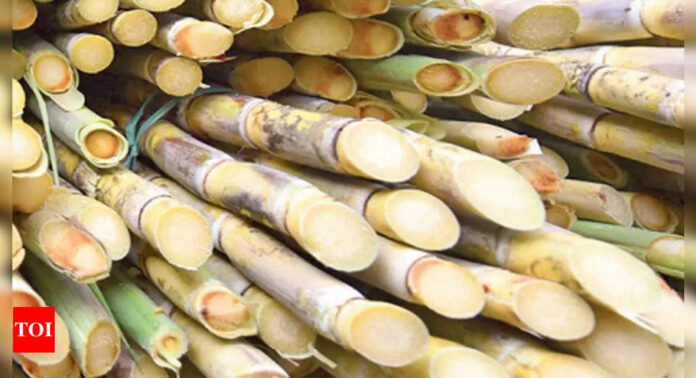CHENNAI: After hitting a peak in 2011 in terms of production and capacity use, the sugar industry in Tamil Nadu has been down since 2016. The area under sugarcane fell with water scarcity and 15 of the 43 sugar mills in the state downed shutters.
The bountiful rain in 2021 has seen green shoots sprouting, but a turnaround is at least a couple of ‘cutting’ seasons away. A hand from the government would help, say mill owners. “This is an industry that caters to five lakh farmers, provides direct and indirect employment to two lakh and generates around `4,500 crore in revenue.
It has been suffering since 2016 due to drought and monsoon failures,” says Palani G Periasamy, executive chairman, Dharani Sugars and Chemicals, and vice- president, Indian Sugar Mills Association (ISMA).
From a peak of 254.65 lakh tonnes of cane crushed and a capacity utilisation of 99% in 2011-12, the sugar industry in Tamil Nadu hit a low of 81.4 lakh tonnes crushing and 31% utilisation in 2016-17. Sugar production fell from 23.8 lakh tonnes to seven lakh tonnes during the period, while sugar recovery came down from 9.4% to 8.6%. In 2020-21, the industry crushed 98.3 lakh tonnes of cane, produced 8.8 lakh tonnes of sugar at a recovery rate of 8.9% and a capacity utilisation of 38%. Capacity utilization has remained below 40% over the past four seasons.
Unlike in other states, mills in Tamil Nadu have a unique problem. The Centre fixes the fair and remunerative price (FRP) per tonne at 9.5% recovery and including the farmers’ transport cost in bringing cane to the mills. But Tamil Nadu millers have to pay transport cost over and above FRP and the sugar they recover from a tonne of cane is also less.
“Fortunately for us, the new DMK government has ordered payment of `150 per tonne to cane farmers for 2020-21, in addition to `42.5 per tonne as transitional production incentive. This move will make it attractive for farmers to return to sugarcane cultivation, thereby leading to higher capacity utilisation for the mills,” says Periasamy.
“When compared to Uttar Pradesh, where recovery is at 11%,, farmers here earn `400 less and spend `500 more per tonne. This has pushed many sugar mills into financial trouble. It is a loselose situation for both sides [farmers and millers] here,” says N Ramanathan, managing director, Ponni Sugars. Industry mulls over two options.
A newer variety of sugarcane to up yield, for which cultivation trials are still on. And, mechanisation of harvesting to cut costs. “Labour cost is high. Mechanised harvesting is the way forward and the state government could incentivize MSMEs in the Coimbatore region, known for their reengineering skills, to develop new cutting tools for sugarcane,” says Ramanathan.
Of course, the industry has other sources of revenue such as co-generation of power and production of ethanol. But there are problems there too. Co-generation of power, by burning bagasse, took off in Tamil Nadu in the late 1990s and did well for about 15 years. Of late, Tangedco has not renewed the PPA (power purchase agreement) at cost-plus-margin basis as recommended by TNERC (Tamil Nadu Electricity Regulation Commission).
Payments are also delayed to mills with valid PPA and those willing to supply power at a lower cost.
“The total payouts to sugar mills in a year for co-generation is around `180 crore to `200 crore or about `15 crore per month. Given the size of Tangedco’s dealings, despite its financial woes, timely payment to this agro-industry may not pinch it much,” say sugar industry sources. “You cannot tie both our hands and ask us to survive.
The state could get Tangedco to make regular monthly payments into escrow accounts with a condition that the money should be used only for paying cane arrears to farmers. Or else permit us to opt for third-party sale without the cross subsidy and surcharges,” says Ramanathan.
The other option, ethanol, has limited scope as Tamil Nadu is a molasses deficit state due to lower capacity utilization of sugar mills. However, the copious rain has raised hopes.





